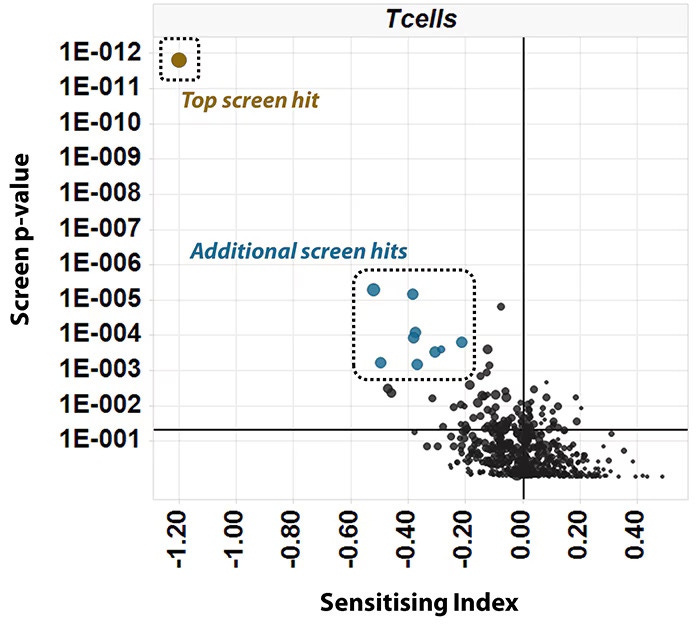
With the rise of CRISPR technologies and the innovative use of T cells in personalized medicine, we have seen a huge boost in both the therapeutic potential of and interest in modified T cells. Genetic screens have become an incredibly valuable tool for discovering and validating new biological insights, drug targets, and understanding how drugs can either resist or become sensitive to treatments. Since the first successful demonstration of a lentiviral approach for pooled functional genomic screening in T cells1, there has been a rise in advanced pooled CRISPR screening technologies in T cells. These advancements have significantly enhanced our ability to identify optimal genetic targets and develop more effective adoptive T cell therapies2.
Advantages of pooled screening
Pooled screening offers the benefits of lower costs and a broader scope, making it a quick and reliable method for identifying potential new drug targets. At Revvity, our scientists have successfully completed several pooled lentiviral CRISPR-Cas9 knockout screens in primary T cells. From extensive development, our customers have reaped the benefits of our screening platform, which uses freshly isolated and stimulated primary T cells. These cells are first transduced with a lentiviral sgRNA library before introducing Cas9 mRNA.
In our validation screen (Figure 1), we conducted a drug-gene interaction analysis by exposing an edited pool of primary T cells to prolonged treatment with a sub-lethal dose of a specific small molecule inhibitor3. We took multiple time points and used T cells from various donors, allowing us to analyze response kinetics and evaluate donor-specific effects. To validate our platform, we monitored the T cells' response rate to a control set of sgRNAs and compared the performance of the primary T cell screen directly with a Jurkat cell line analysis.
Our screen successfully identified new genes that are crucial for the survival of primary T cells, as well as genes that influence how T cells respond to the small molecule inhibitor treatment. Because the drug we used had a known mechanism of action, these findings directly supported the specificity, sensitivity, and overall quality of our platform.

Figure 1: Gene sensitivity analysis showing essentiality of hits in the presence of a small molecule inhibitor
Unlocking the possibilities
Our successful application of pooled CRISPR screens in primary T cells opens the doors to significant scientific discovery in crucial areas of research, including immuno-oncology. This technology can help researchers to accelerate their studies in primary T cells and opens up possibilities for building increasingly complex screening paradigms applicable to human disease.
Learn more about how our functional genomic screening services can help to accelerate your preclinical research.
Reference
- Shifrut, E. et al. (2018) Genome-wide CRISPR Screens in Primary Human T Cells Reveal Key Regulators of Immune Function. Cell.
- Xiang, M. et al. (2024) Functional CRISPR screens in T cells reveal new opportunities for cancer immunotherapies. Molecular Cancer
- Birsoy K, Wang T, Chen WW, Freinkman E, Abu-Remaileh M, Sabatini DM. An Essential Role of the Mitochondrial Electron Transport Chain in Cell Proliferation Is to Enable Aspartate Synthesis. (2015) Cell, 162(3):540-551.
For research use only. Not for use in diagnostic procedures.

































